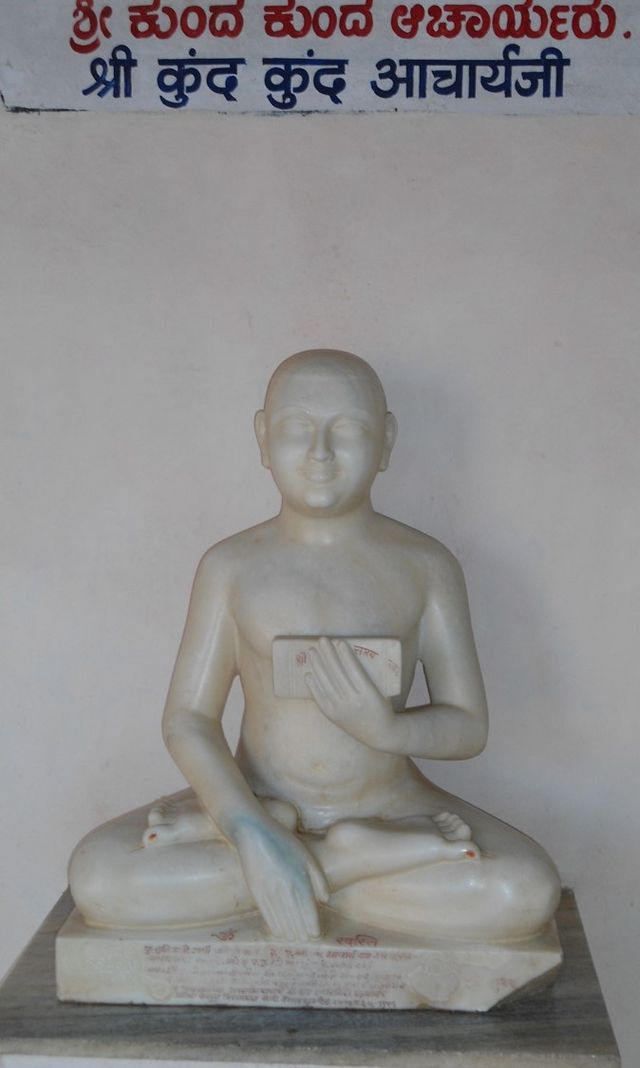In Indian religions and society, an acharya (Sanskrit: आचार्य, IAST: ācārya; Pali: ācariya) is a religious teacher in Hinduism and Buddhism and a spiritual guide to Hindus and Buddhists.[1][2] The designation has different meanings in Hinduism, Buddhism and secular contexts.
This article needs additional citations for verification. (March 2015) |
Acharya is sometimes used to address an expert teacher or a scholar in any discipline, e.g.: Bhaskaracharya, the expert mathematician.
Etymology
The Sanskrit phrase ācāraṁ grahāyati ācāraṁ dadāti iti vā means Acharya (or teacher) is the one who teaches good conduct to one's students.[3][4] A female teacher is called an achāryā, and a male teacher's wife is called an achāryāni [5]
In Hinduism
The term 'Acharya' has numerous definitions. Hinduism frequently uses the terms "acharya" and "guru" interchangeably. According to the Dharma Shastras, acharya is the one who imparts knowledge of the entire Veda to a student and performs upanayana sanskar.[4]
According to Nirukta, an ancillary discipline associated with the Vedas, an acharya is an individual who imparts knowledge to a student, collects wealth from the student, and helps pupils understand behaviour based on moral norms.[4]
According to Manusmriti, the individual who, having initiated a pupil, teaches him the Veda along with the ritualistic and esoteric treatises—him they call, ‘Ācārya,’ ‘Preceptor’—(140)[6]
Other authors' definitions:[6]
- Gautama-Dharmasūtra, 1.10-11. — ‘The Upanayana is the second birth. He from whom this is received is the Ācārya.’
- Āpastamba-Dharmasūtra, 1.2.24-27.—‘He from whom one gathers (learns, ācinoti) his duties is the Ācārya; he brings about the essence of knowledge; this constitutes the highest birth.’
- Vaśiṣṭha-smṛti, 3. 24.—‘He who, having initiated him, teaches him the entire Veda is the Ācārya.’
- Viṣṇu-smṛti, 29.1.—‘He who, having initiated the pupil and taught him the observances, teaches him the Veda, should be known as the Ācārya.’
- Yājñavalkya-smṛti, 1.34.—‘He who, after initiating, teaches the Veda is called the Ācārya.’
Prominent acharyas in the Hindu tradition are as given below :
Buddhism
In Buddhism, an ācārya (Pali: ācariya) is a senior teacher or master. In Theravada it is sometimes used as a title of address for Buddhist monks who have passed ten vassas. In Thai, the term is ajahn, and in Japanese, it is ajari.
In Vajrayana Buddhism, tantric masters are known as vajrācāryas (Tibetan: dorje lopön; Jp. "kongō ajari" 金剛阿闍梨).
In Jainism

In Jainism, an acharya is the highest leader of a Jain order. Acharya is one of the Pañca-Parameṣṭhi (five supreme beings) and thus worthy of worship. They are the final authority in the monastic order and have the authority to ordain new monks and nuns. They also have the authority to consecrate new idols, though they occasionally appoint scholars to carry out this duty.
An acharya, like any other Jain monk, is expected to wander except for the Chaturmas. Bhaṭṭārakas, who head institutions, are technically junior monks, and thus permitted to stay in the same place.
In scientific/mathematical scholarship
Acharya (degree)
In Sanskrit institutions, acharya is a post-graduate degree.[11]
See also
References
External links
Wikiwand in your browser!
Seamless Wikipedia browsing. On steroids.
Every time you click a link to Wikipedia, Wiktionary or Wikiquote in your browser's search results, it will show the modern Wikiwand interface.
Wikiwand extension is a five stars, simple, with minimum permission required to keep your browsing private, safe and transparent.